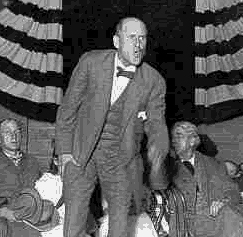|
-
Socialist
Party USA: The Socialist
|
-
-
July/August 2008: E.V. Debs and the
Socialist Presidential Campaign
 Eugene Victor Debs,
who was the Socialist Party candidate for president five times between
1900 and 1920, had a lot to say about the importance of participating
in elections to further the cause of socialism. His experience as an
organizer of railway workers led him to hope that the Socialist Party
could become the labor party for the USA. “The laboring man has found
that in unions he can win his fight for existence, but now he is
beginning to learn that success in his battle is impossible without
unity in politics.” Eugene Victor Debs,
who was the Socialist Party candidate for president five times between
1900 and 1920, had a lot to say about the importance of participating
in elections to further the cause of socialism. His experience as an
organizer of railway workers led him to hope that the Socialist Party
could become the labor party for the USA. “The laboring man has found
that in unions he can win his fight for existence, but now he is
beginning to learn that success in his battle is impossible without
unity in politics.”
The 1900 platform listed two long range goals: the organization of the
working class into a political party and the abolition of wage slavery
by establishing a national system of cooperative industry based on
common ownership. In 1904 Debs had as his running mate, Benjamin
Hanford, a popular New York typographer who attracted national
attention with his mythical “Jimmie Higgens,” a whimsical cartoon
character who represented the rank-and-file Socialist who did all the
work, while party leaders took all the credit.
Debs praised workers for learning how to strike together, to unite
against injunctions, even to die together. He asked them to vote
together and to “place the union label” on the ballot.
The 1904 election results showed that the Socialists had quadrupled
their voting strength since 1900 with Debs receiving 402,321 votes,
surpassing the anti-labor Democratic Party candidate. Theodore
Roosevelt who won with a two million vote majority, said this
represented a threat, “far more ominous than any Populist or similar
movement in time past.” He felt pressured into making progressive
reforms while in office to diminish the appeal of socialism.
Four years later, Debs criticized Roosevelt and his successor Taft from
“The Red Special,” the Socialist Party campaign train, which crossed
the country and enabled him to reach a wider audience. He blamed the
politicians for the recession of 1907 which had created mass
unemployment and empty dinner pails.
On average, Debs gave
two major speeches each day and many short talks at whistle-stops. He
often told audiences that he was not appealing to them to vote for him
as much as for them to read the socialist literature and to prepare to
solve “the problems that the rising generation faced.” A pre-election
upturn in the economy and Taft’s promise of “full dinner pails”
attracted voters and Debs received only 18,472 more votes than he had in
1904.
In explaining his
philosophy in 1908, Debs said, “We aren’t playing to win—not yet. We
want a majority of Socialists, not of votes. There would be no use
getting into power with a people that did not understand; with a lot of
officeholders undisciplined by service in the party...I am running for
president to serve a very humble purpose: to teach social consciousness
and to ask men to sacrifice the present for the future, to throw away
their votes to mark the rising tide of protest.”
Debs most pithy statement about elections was, “I’d rather vote for
what I want and not get it than to vote for what I don’t want and get
it.”
This year, some of our readers will have the opportunity to vote for
Socialist Party-USA candidates Brian Moore and Stewart Alexander, but
many won’t. Since Deb’s day our two business parties have made it
harder for us to get on the ballot in more than a handful of states by
making ballot access requirements so difficult. We urge you to look for
Moore and Alexander on your state ballot in November and vote for a
life-affirming future where people come before profits.
|
-\
Subscribe to The Socialist.
Now only $10 a year!
|

